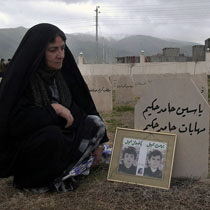
Tuesday, June 26, 2007

Ali Hassan al-Majid earned his nickname from ordering the chemical-weapons attack on Halabja that killed 5,000 Kurds in 1988. He was sentenced on the weekend for his role in the overall campaign of bombings, deportations and gas attacks against civilians, a campaign known as al-Anfal.
It stretches human comprehension that a government could drop mustard gas and nerve toxins on its own people; or that almost two decades could pass before the men responsible had to answer for their crimes.
Mr. Majid did not seem surprised at the verdict. "Obviously," he said, smiling. Men like Mr. Majid don't expect to die in bed. His cousin, Saddam Hussein, was hanged a few months ago.
Vengeance is an empty pleasure. The Iraqis could kill these men many times over and still not feel that they've put the past behind them. Many Kurds are unhappy that Saddam died before he could be killed in retribution for his crimes against the Kurds. Mr. Majid received five death sentences, and none of them were for Halabja.
The hangings in Iraq may bring grim satisfaction to some victims, but they won't end the pattern of violence. They won't get health care for the sick, jobs for the poor, homes for the elderly in Kurdistan. They won't bring babies back to life.
The bad memories in Kurdistan linger. And while the northern region of Iraq has had a relative measure of prosperity and peace since the toppling of Saddam, that modest success has only put the larger Kurdish situation in relief. The idea of a Kurdish homeland, stretching across Turkey, Syria, Iraq and Iran, is seductive.
If every persecuted population were granted its own state, the Kurds would be at the top of the list. But international politics doesn't always work that way. The region is so volatile that Kurdish demands for independence in the short term are likely to backfire and lead to more bloodshed and less autonomy.
Turkey has sent a nervous warning to Iraqi Kurdistan to steer clear of its conflict with Kurdish separatists. According to Turkish officials, two such separatists died in a failed suicide attack on a Turkish military post on Saturday.
This is a part of the world that has seen enough blood. Turkey must take care not to trigger more violence or to undermine the chances for peace in northern Iraq.
As for the Kurds, change must come gradually, peacefully, politically. Iraqi Kurdistan can be an example to the rest of the region, if it consolidates democracy and tolerance for minorities.
Although the death of Mr. Majid will not end the violence in Iraq, his conviction for genocide and war crimes does at least show that mass killers do sometimes pay for their crimes.
For 25 million Kurds in several countries, justice is bigger than one man. Chemical Ali no longer poses a threat; the fighting on the Turkish border does.


